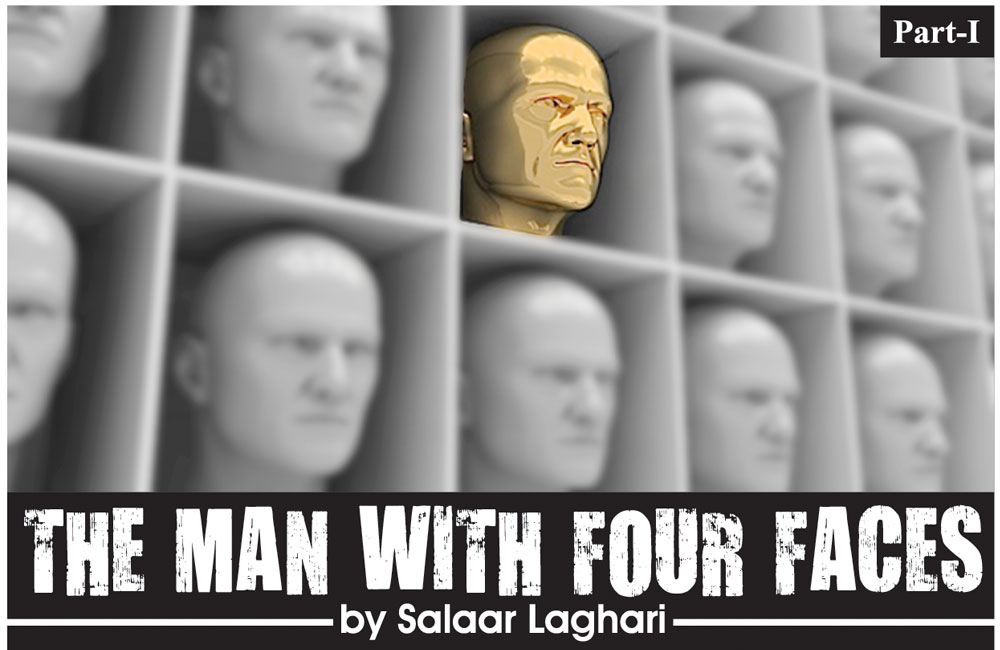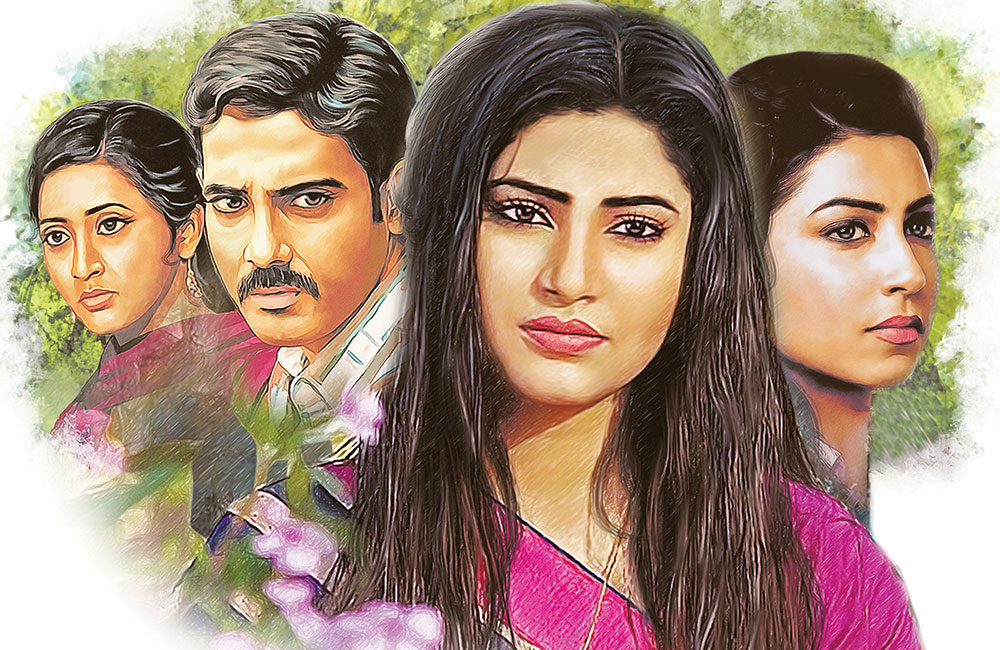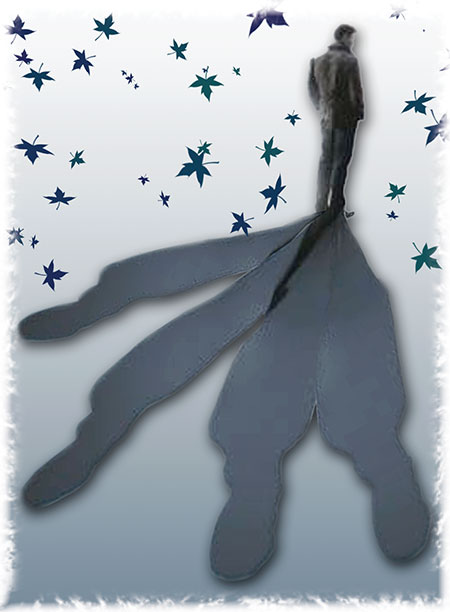An Epidemic
- 13 Apr - 19 Apr, 2024

Present Day
At Karachi’s Mental Hospital for Women, three psychology students were following their professor’s footsteps. Professor Zeeshan Akbar was a psychologist himself and was helping the three female students with their report on a mental illness.
They stopped outside a room. Its keeper opened the lock on Professor Zeeshan’s request. The students looked inside the room and saw a fine-looking woman sitting on a bed. Her clothes were dirty and she seemed extremely upset.
“Her name is Omama Hami,” the professor introduced. “She’s one of those patients.”
“But she seems absolutely fine!” one of the students responded.
“I know, but she’s really not. You’ll learn more about her condition.”
Next minute, they stood outside another room. The shutter of the room was open so the professor asked his students to take a glance at the other patient. She was the same age as the previous woman.
“Her name is Farheen Abidi,” the professor stated.
This woman seemed ill, as her eyes were closed and her mouth open, with saliva dripping out.
Anyways, the psychologist and the three students walked past that room and stopped outside another. The keeper of the room allowed them inside to look at the patient. This one had dirty clothes, with matching hair. It looked as if she hadn’t taken a bath in a long time.
“What’s her name?” one of the students asked.
“Shehla Mohsin…” the professor replied, “She has the same disease as the other two patients.”
“Really?”
“Yes. We need to see one last patient now.”
They walked a little farther this time, until, they saw a mentally ill woman being dragged by two nurses.
“That’s her.” Professor Zeeshan spoke, recognising the patient’s face, “Her name is Eruj Noor and she is suffering from the same mental illness as Farheen, Omama and Shehla.”
The ill woman was trying to speak, but her words came out as a stutter. They listened closely to find out what she was saying:
“Hating is easier than loving.”
The wise words from an insane woman surprised them all.
“Were they sane before they got this disease?” a student asked.
“Of course, they were! They were perfectly normal and healthy women. In fact, some of them even have children.”
“So…what happened to them?”

“Let’s go out,” the psychologist suggested, “I’ll explain everything in the canteen.”
Several minutes later, the three students and their professor were sitting at the canteen, when one of the students asked, “So who did this to these women?”
“In my opinion,” Professor Zeeshan continued after having a sip of water, “The person responsible for their condition is Zubair Karwani.”
“Zubair?” the student repeated. “Who is he?”
The professor did not answer. He changed the subject instead.
“Anyways, you should read about the lives of these women to find out how sane they were.”
They talked for a while until the waiter showed up to take their orders.
Three Months Earlier
I was waiting outside Omama’s apartment. She came and answered the door. She was a perfectly healthy girl, twenty-three years of age. She looked at me and apologised, saying, “Sorry for being late, Saad.”
“It’s okay,” I replied kindly. “Are you ready?”
“Yes I am, let’s go,” she said stepping outside and shutting the door.
Next minute, she was driving her car while I sat right next to her.
“Once again Omama,” I said looking at her, “Thank you for this treat.”
She chuckled courteously and spoke, “Anytime Saad… you’re my only friend. Who else would I share these moments with?”
I smiled but did not answer.
Thirty minutes later, Omama and I were inside the cinema hall. We had planned to watch a movie together but it turned out quite boring. We were both losing interest so she tried to make a small talk.
“How’s your family business going?”, she asked me.
“Uh… It’s good. It’s quite successful.”
“So you are the owner of that construction company?”
“Yes, my father was but he made me the owner before he passed away.”
We talked as the movie progressed. The movie was not interesting but we were enjoying each other’s company.
Next day, I was at the supermarket after delivering important files to my boss’ house, where I was given the task of buying some groceries. In the meantime, Eruj, a forty-year-old woman came along with her ten-year-old son. She stood right in front of me.
“Hi, how are you?” I got delighted seeing her.
“We’re good, what about you, Abdullah?”
“I’m also fine. I wasn’t expecting you here today.”
“Well, to be honest, I came here for you.”
“That’s so kind of you ma’am, but right now I’m a bit busy with work. Can we meet after 1 O’clock?”
“Will they leave you after one?” she asked out of surprise.
“Well, there are plenty of clerks to take my shift.”
“Working as a clerk is easy for you, isn’t it?”
“Yes, indeed.”
As I continued my task, she waited for me till 1 O’clock. Then I took the day off and left with her.
That week’s Wednesday, I went to Farheen’s house in the afternoon. She opened the door when she heard me knocking.
“Come inside,” she spoke, allowing me in.
I looked around. She lived alone, as she had no family at all. Her brother, who lived abroad, was her only financial support. She asked me to sit on a sofa in her lounge. I did so.
“Ahsan, I’ve known you for quite a long time,” she said standing in front of me, “But we hardly meet.”
“Well, you’re right.”
“You know what I’m trying to point out.”
“No…” I got a bit confused.
“My point is that you hardly drop by!”
“Oh, that.”
“Look Ahsan, I’ve known you since college and it’s been like six years that we’ve been friends.”
“Well, I’d say more than friends.”
“Ahsan, I’m noticing that you are changing. You are losing interest in this relationship.”
I stood up smilingly and gently tried calming her down.

“Sit down please, everything’s going to be fine.”
“First you promise me that you’ll drop by more often.”
“All right, I promise,” I vowed, maintaining eye contact.
She believed me and looked apparently relieved. When she sat down next to me on the sofa, I asked, “Now tell me, is there anything else that’s bothering you?”
“My brother’s not helping me financially as frequently as he used to,” she answered instantly. “I can barely make both ends meet. My expenses are skyrocketing while my income has reduced!”
“All right, stop,” I said politely, “There’s something you need to understand about money. The society we live in is a slave to money.”
“Come again,” she sounded confused.
“Let me tell you an interesting story. In fact, it is not a story at all, it’s a real-life tale.”
“Ok, I’m listening.”
“There was once a boy who lived in a western country. He was fifteen or sixteen, something like that, and was blessed with a lot of wealth. His father was one of the richest man in the country. Now, the most unusual thing about the young boy was that, he could not tell cash and money apart.”
“What?” she seemed amazed.
“Yes! Despite being the son of the wealthiest person, he had no knowledge about money, cash or paper currency.”
“Oh dear,” she chuckled silently.
“His father had given him plenty of debit and credit cards. And interestingly, the country had more usage of cards than cash, so the boy survived. “
“Really?”
“Yes, cash was used only in small businesses or stalls. Anyways, now this young boy was used to spending money through cards and had no idea about this concept of amount deduction, after purchasing any product. Then one day while he was out on his eighteenth birthday, he bought a cheap cake for himself from a stall. So, when he showed his credit card to the stall owner, he refused to accept it and demanded cash.”
“Wow!” she was gaining interest in the story.
“The young boy had no idea what cash was and simply asked the stall keeper, who couldn’t believe the boy’s innocence and just took his cake back, refusing to sell him anything. It was the first time the boy had not gotten what he wanted, because he had learnt something new. A word called cash!”
“What happened, then?”
“That night, the boy couldn’t sleep as he kept on thinking what money or cash was. The next day when he asked his father, he told him everything about money and also showed him what it looked like. Later, his father concluded by saying, ‘I was only trying to protect you from this thing called money. This was why I never told you about it.’ The boy was surprised at how a piece of paper could prove harmful for him. Then his father explained that money rules everything and that people become slaves to it.”
She seemed impatient when I paused, so I continued, “The young boy left the country where he had been living, after a few years to see how people were becoming slaves to money. His sole objective was to find out how a small piece of paper can change or destroy lives the way his father had described him. Then he reached Pakistan. Within a few weeks of his stay here, he realised, that his father was right. People were so desperate for this small piece of paper that they were willing to risk their lives to earn it. Siblings disregarded family relationships just for the sake of money. Some professionals were willing to trade their souls and moralities for the acquisition of money. A mere piece of paper. While the reality of money slowly dawned upon him, he realised that he himself had become slave to it and was unfortunately dependent on it.”
“Wow,” she uttered as she realised that the story was over.
“So, this story gives us a very important lesson, Farheen. It tells us that money should not be something we can trade our souls for. Money, may be important, but not as important as our close relationships. Our families and people we love and care about. Money should not be a priority. We should not let our happiness depend on it. There’s a lot more that can make us happy. Money is not essential for a happy life, gratitude is. Think of it as a piece of paper.”
She was moved. She leaned back on her couch and gave my words a thought. After a few minutes, she noticed that I was gone. It wasn’t anything new to her, so she just smiled and said, “He always leaves like that.”
Next day, I sat with an aged woman in my house. She was obviously older than me. Shehla Mohsin was a divorcee with two kids, a girl and a boy. I asked, “So, where are your kids?”
“They’re spending the weekend with their dad.”
“I see,” I thought for a while and then asked, “You don’t miss him, do you?”
“No, I don’t think so.”
“Don’t worry, you’ll get over him.”
“Thank you, Rashid,” she said in a tender voice, “Your motivation is my strength.”
I smiled and turned my eyes away.
“So, how’s your lecturer-ship?” she asked me.
“Yes, it’s good, working as a professor has always been a passion so I am doing great.”
“Can I come and visit the university some day?”
“Sure, of course. I would love to show you around.”
Well, so that was me. One man with four different personalities. Four different identities. And four different girlfriends. The questions were: which personality was real and which relationship I was actually committed to?
to be continued...
COMMENTS